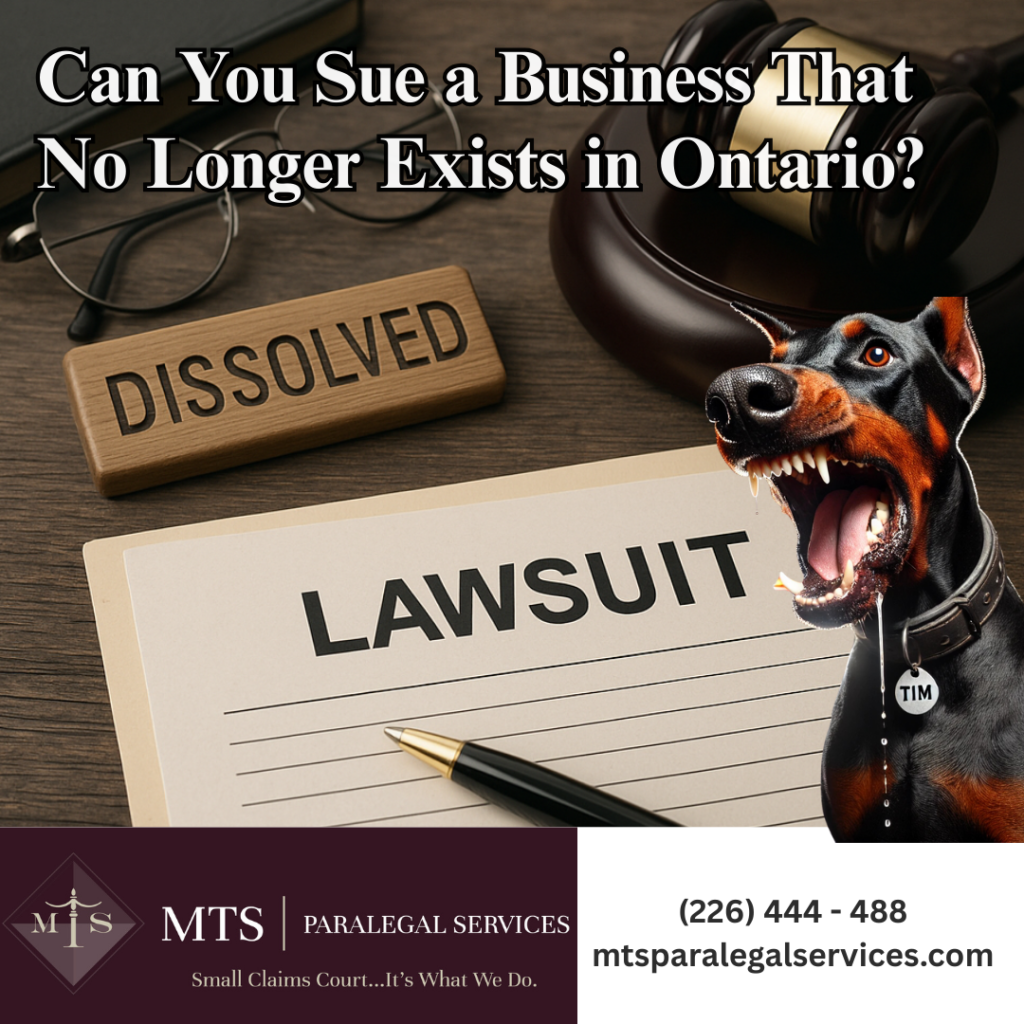
Can You Sue a Business That No Longer Exists in Ontario?
When a business in Ontario ceases operations, either by dissolution or abandonment, it may appear that all legal ties are severed. However, under Ontario law, the situation is more complex. If you believe you have a valid claim against a company that is no longer operating, you may still be able to pursue legal action—depending on the circumstances. At MTS Paralegal Services, Tim frequently assists clients in navigating these nuanced legal scenarios.
Can You Sue a Dissolved or Defunct Business in Ontario?
In Ontario, it is possible to sue a business even after it has been dissolved, but several legal factors must be considered. Under the Ontario Business Corporations Act (OBCA) and the Canada Business Corporations Act (CBCA), a dissolved corporation does not immediately become immune from legal action. A corporation that has been dissolved can still be sued for actions that took place while it was active.
This is especially relevant in cases involving:
- Breach of contract
- Unpaid debts
- Personal injury claims
- Negligence
- Product liability
According to section 242 of the OBCA, an action or proceeding may be commenced against a corporation within two years of its dissolution, as though the corporation had not been dissolved. This means that plaintiffs have a limited window of time to initiate legal proceedings after the dissolution date.
Who Can Be Held Liable?
Although the business entity itself may be dissolved, you may still have options for recovery. Under certain conditions, former directors or shareholders of the business can be held personally liable—particularly in cases involving fraud, breach of trust, or unpaid wages. In some instances, assets that were improperly distributed upon dissolution can also be subject to claims.
In addition, if the business continued to operate informally after its official dissolution, it may be considered a de facto corporation, and still subject to legal responsibilities.
What If the Business Was a Sole Proprietorship?
If the business was a sole proprietorship, suing becomes a matter of suing the individual owner directly. Dissolution does not shield the owner from liability for actions taken under the business name. In these cases, tracing the individual’s assets and legal identity is key to initiating legal action.
How to Proceed With Legal Action
If you believe you have a valid claim against a closed business in Ontario, it is critical to:
- Verify the Business Status – Determine if the business is dissolved, bankrupt, or simply abandoned.
- Check the Limitation Period – Ontario’s Limitations Act typically provides a two-year window from the date you knew or ought to have known about your claim.
- Gather Evidence – Contracts, communications, and invoices can support your case.
- Seek Legal Advice Promptly – The process can be complex, especially when personal liability or asset tracing is involved.
Tim at MTS Paralegal Services is experienced in handling claims involving dissolved or inactive businesses and can help determine the best course of action in your case. Whether you’re pursuing a debt claim or seeking redress for damages, having knowledgeable legal representation is essential.
Don’t delay your rights—legal deadlines apply, and acting promptly can improve your chances of success.
Call Tim at MTS Paralegal Services today at (226) 444-4882 or visit https://mtsparalegalservices.com for trusted legal guidance across Ontario.
This content does not constitute legal advice. For up-to-date guidance or legal advice specific to your situation, please contact MTS Paralegal Services Professional Corporation or call (226) 444-4882.
